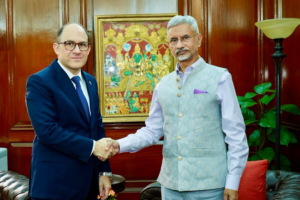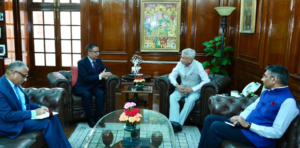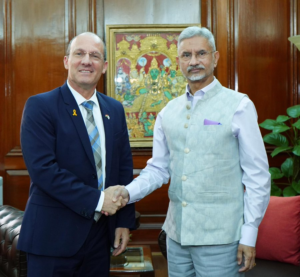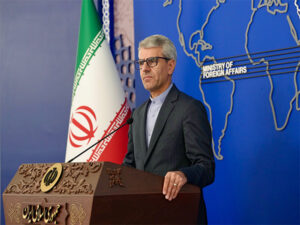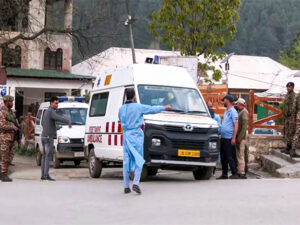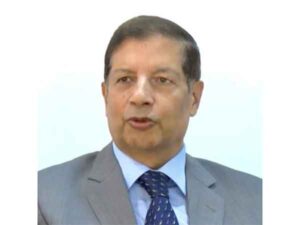National Rehabilitation Centre: Prominent role in preventing drug addiction and protecting society from its dangers
Abu Dhabi [UAE], June 25 (ANI/WAM): The UAE is joining the international community in celebrating the International Day Against Drug Abuse and Illicit Trafficking under the theme “People first: stop stigma and discrimination, strengthen prevention. The Day sheds light on the global crisis that communities face as a result of the abuse of psychotropic substances, and to raise awareness of its dangers and negative impact on the individuals and societies as a whole.
The International Day against Drug Abuse and Illicit Trafficking is marked on June 26 every year, to strengthen action and cooperation in achieving the goal of a world free of drug abuse.
And each year, individuals, entire communities, and various organizations all over the world join in on this global observance, to raise awareness of the major problem that illicit drugs represent for society.
The aim of this year’s campaign is to raise awareness about the importance of treating people who use drugs with respect and empathy; providing evidence-based, voluntary services for all; offering alternatives to punishment; prioritizing prevention; and leading with compassion. The campaign also aims to combat stigma and discrimination against people who use drugs by promoting language and attitudes that are respectful and non-judgmental.
In the following report, the Emirates News Agency (WAM) reviews the UAE’s efforts in general and the National Rehabilitation Centre (NRC) in drug control and raising awareness of its dangers.
The UAE’s efforts in combating drugs are in accordance with a comprehensive strategy that takes into account this issue, which poses a serious threat to countries all over the world. The UAE has worked continuously to update laws and legislations related to drug control, in addition to security, preventive, curative and awareness efforts.
NRC’s efforts in combating addiction and psychotropic substances and raising awareness of their dangers have reached very advanced levels, comparable to the most prestigious international institutions.
Since its establishment, the NRC has contributed to raising societal awareness of the dangers of addiction through innovative programmes and plans in facing it, in conjunction with the development of medical treatment services, studies and scientific research which would contribute to achieving its operational objectives.
In 2022 and the first quarter of 2023, the centre achieved a number of prime accomplishments including increasing the capacity of the centre from 78 beds to 90 beds by the end of 2022 to 114 beds by the end of the first quarter of 2023.
It also improved and developed the channels for requesting the centre’s services through the TAMM and its website, in addition to the smart application and telephone communication.
The Treatment procedures and programmes have also been reviewed and upscaled to enhance patients’ experience and treatment outcomes and to increase the number of outpatient clinics to accommodate the largest number of patients and reduce waiting lists.
The centre is equipped with the-state-of-the-art technology techniques that assist in the treatment of addiction, such as the use of smartphones, applications and Internet programmes.
In the centre, technology was utilised to create support groups via videoconferencing to provide documented technical resources for patients and their families, in addition to follow-ups for patients through some advanced programmes that help in following up with patients remotely while they are at their homes.
A new programme is being developed for the first time, which will be used to monitor and follow up addiction patients remotely.
This programme will also enable the medical team to communicate with the patient, follow up on his vital signs while at home, and provide immediate medical advice.
The centre is working on creating a number of treatment programmes and presenting them to patients, where a specialised clinic for teenagers has been created, the (Adolescent Outpatient Programme), which is a dynamic, specialised service that seeks to involve young people between 15 and 18 years old, who suffer from substance use disorder (SUD), through which a comprehensive multidisciplinary assessment that fit their needs through evidence-based medical and psychological interventions.
A specialised gym has also been established for patients, which contributes to the rehabilitation process and serves patients even after discharge from the centre.
A building for visitors has also been established to preserve patients’ privacy during entry and exit from the centre.
At the same time, it provides a suitable place for family visits and reduces the number of waiting days to a maximum of 14 days.
The intake and assessment of patients with addiction problems is a comprehensive and collaborative process between the patient and the NRC clinical team, headed by the psychiatrist. Each one of the clinical team meets with the patient and does his/her assessment and by the end of the intake/assessment process, the team members convene to decide the most suitable treatment plan for the patient and then allocate the patient to the appropriate services according to assessed needs and identify and do a referral to other services if needed, for example, referral to the ER in case of a medical emergency.
The purpose of the assessment is to establish a therapeutic relationship with the client; obtain full history regarding drug and alcohol use problems, other comorbid psychiatric or medical problems, social/family problems, legal and financial problems and formulate a multidisciplinary treatment plan for the patient, who remains under observation at outpatient’s clinic for at least four months and some patients need years for treatment.
The addiction treatment aims to help patients get rid of substances from their bodies in a safe manner and overcome the side effects which may accompany this phase, help patients to abstain from using drugs and work as hard as possible in order not to revert back to using once more, help patients to return back to their normal lives and avoid complication which may result from using substances such as contracting some serious diseases, accidents or death.
The NRC applies other methods in its treatment like real patient success stories, the vocational programme which aims to train patients on computer skills and applications which shall help them attain a useful qualification which help them market themselves in the labour market or develop their private business and digitalising them and the recreating programme aims to include inpatients in the general, religious and seasonal celebrations such as the end of Ramadan celebration, Eid Al Adha, Martyr Day, National Day, Mid-Sha’aban, haq Laila and Ramadhan evening celebrations.
The NRC has many facilities including a library, gym, Majlis and outside garden.
The NRC has received a prestigious certification from the United Nations. The World Health Organisation (WHO) has appointed NRC as a collaborative centre in the field of “prevention and treatment of disorders resulting from the use of psychotropic substances”, making it the first addiction treatment centre in the UAE to receive this designation in the Middle East.
This recognition strengthened NRC’s status as a leading centre in the prevention, treatment and rehabilitation of addiction at regional and global levels.
The NRC has achieved a scientific achievement for the second time in a row, the first of its kind and unprecedented in the Middle East, Africa and the Gulf region, by obtaining an accredited certification from the United Nations Office on Drugs and Crime (UNODC) in Vienna as a “Participant and Collaborative Centre”.
The Centre was awarded the certificate as a Participant and Collaborative Centre with the United Nations Office, for the second time in a row, in the discovery and analysis of traditional, manufactured and modern narcotics drugs, proving its excellence in developing accurate and sensitive methods to identify chemical changes in modern drugs composition, after fulfilling all the requirements for participation in the ‘Drug and Substance Use Testing Laboratories’ programme.
Dr Aref Al Shehhi, CEO of NRC, said, “This outstanding achievement solidifies the UAE’s prominent status and puts the emirate of Abu Dhabi at the forefront of the Middle East. This accomplishment would not have been possible without the support of our wise leadership and their guidance that enable us to compete regionally and globally.”
He added, “NRC’s efforts in combating addiction and psychotropic substances have contributed to raising community awareness of the dangers of drugs and have reached advanced levels comparable to the most prestigious international institutions, through innovative programmes and plans designed to address this pressing issue. Such efforts are made in conjunction with the development of treatment services, studies and scientific research that will achieve the Centre’s operational objectives.”
“NRC has always demonstrated its regional status as a leading centre in the delivery of addiction prevention, treatment and rehabilitation services. Furthermore, the Centre has set new benchmarks in providing treatment, rehabilitation and training services through adopting effective and scientifically proven methods in the treatment of addiction.”
The NRC has conducted a series of research and studies to understand and effectively respond to addiction and to develop research-based monitoring and evaluation (surveillance programmes).
As a centre of excellence that collaborates with the World Health Organisation (WHO) in the field of substance abuse in the Middle East, the NRC has joined the International Technology Transfer Centre (ITTC) network, making it the only entity from the region to become part of this network.
The network aims to develop the skills of professionals, organisations and systems that provide substance use prevention, treatment, rehabilitation, and recovery support services.
The ITTC Network will contribute to implementing the modules included in the training programmes not just in the UAE, but also in the wider region.
The centre established a partnership with the Colombo Plan to enhance its position and role as an international centre of excellence in all areas related to decreasing drug and alcohol demand. The agreement aims to establish a journal which specializes in substance use disorders (International Journal of Prevention and Treatment of Substance Use Disorders), deliver various training courses to a variety of organisations in the UAE, and conduct awareness campaigns and publish information through the internet, audio-visual media and social platforms.

